|
|
The Bill takes back control of UK borders and paves the way for a new points-based immigration system
Reporter: Stuart Littleford
The Immigration and Social Security Co-ordination (EU Withdrawal) Bill 2020 introduced on 5 March will have its Second Reading in the House of Commons today (Monday 18 May) just six months since the British people voted to introduce a points-based immigration system.
This represents an important milestone in paving the way for the new immigration system that will deliver for the UK for years to come and puts an end to the European Union’s rules on free movement.
The Bill signals the Government’s commitment to delivering a fairer and skills led immigration system, attracting people based on the skills they have, not where they are from.
The Home Secretary, Priti Patel told GPSJ:
“This historic piece of legislation gives the UK full control of our immigration system for the first time in decades and the power to determine who comes to this country.
“Our new points-based system is firmer, fairer, and simpler. It will attract the people we need to drive our economy forward and lay the foundation for a high wage, high skill, high productivity economy”
This is a once in a generation opportunity to build a future that works for the whole of the UK and for employers to focus on upskilling and investing in the workforce this country has. 
This Bill gives the UK flexibility and control over its borders so it can attract top talent from around the world to complement the skills already here.
Talented doctors, nurses and paramedics from all over the world are currently playing a leading role in the NHS’s efforts to fight coronavirus and save lives and we thank them – and all our NHS staff – for the work they are doing.
Our new immigration system will make it easier and quicker for medical professionals around the world to work in the NHS through a new fast-track NHS visa.
Further information on the points-based system will be detailed in the Immigration Rules published later in the year.
 Real-Time Payment Notifications provide real-time updates on card acceptance transactions Real-Time Payment Notifications provide real-time updates on card acceptance transactions
Payment specialist allpay limited, has launched Event Driven Payment Analytics. Real-time payment notifications now provide instant updates on card acceptance and payment transactions.
Teejay Townsend, card acceptance product manager allpay explains: “We are now offering this new feature to update organisations instantly on payments made over the internet, via our mobile app or over the phone. This is of particular benefit for bill payers, as it prevents them being chased needlessly for payments they have already made.
“Previously, a payment information file (PIF) would be sent to the receiving organisation within 24 hours but for urgent, time sensitive payments for court fines or eviction notices for example, this may be too slow or even too late. Real-time notification could also stop tenants being charged for rent areas if they have already paid too and, it is also helpful when paying deposits, as systems and customer balances can be kept up to date as bills are paid. PIF files will still be available as usual the next working day.
“Real-Time Payment Notifications cover successful payments, declined payments and refunds. In addition to providing a better service to customers, the implementation of Event Driven Payment Analytics can cut the resources required to recover late payments, as staff are acting on the most up to-date information.
“Event Driven Analytics is now available for a small one-off fee and low monthly cost. We hope this new real-time payment notification service will be helpful for government organisations and housing associations taking regular payments, to ensure that they are always able to respond to the most up to date information available for the benefit of their users.”
For more information please see: www.allpay.net/our-solutions/credit-debit-cards/real-time-notifications/
 New edition of a biography of Alexander Wilson throws new light on how and why the ‘Alec Wilson’ of the BBC series ‘Mrs Wilson’ was thrown out of MI6 during the Second World War. New edition of a biography of Alexander Wilson throws new light on how and why the ‘Alec Wilson’ of the BBC series ‘Mrs Wilson’ was thrown out of MI6 during the Second World War.
The book reveals he could have been unfairly discredited because of mistakes by the country’s intelligence agencies.
Professor Tim Crook of Goldsmiths, University of London has painstakingly researched every aspect of the life of the multiple bigamist, spy writer and Intelligence officer over 13 years.
The Secret Lives of a Secret Agent was the foundation of the BBC dramatization along with a short memoir written by Wilson’s third wife Alison.
Professor Crook has shared his royalties equally with the different parts of Alexander Wilson’s families.
They have acknowledged that his ‘years of patient research,’ made them ‘aware of each other’s existence’ and enabled them ‘to become united as one strong and loving family.’
The first edition in 2010 revealed the extent of Wilson’s successful spy writing career producing a series of novels that was the James Bond of the 1930s, and his connections with the Secret Service.
Three years later this led to the release to the National Archives of a file outlining how his career in MI6 came to an ignominious end.
In the second edition published this week he reveals:
- Alexander Wilson probably faked the burglary of expensive jewellery from his London home in 1942 so he could raise money to pay for expensive antibiotics that saved the life of his third wife Alison- played in the series by her granddaughter- the award-winning actress Ruth Wilson.
- MI5 and MI6 probably made a mistake when deciding he had faked intelligence reports that the Egyptian Ambassador in London was running a network of agents collecting intelligence.
- Professor Crook says that it is just as likely the Ambassador and his staff had pretended to run a network when they knew their phones were being listened to and that Wilson was translating and reporting what he heard accurately.
- Crook’s research indicates the Egyptians were plotting their independence from Britain, and other files in the National Archives suggest the Ambassador, Hassan Nachat Pasha, was gathering intelligence from different sources in London.
- Crook highlights evidence British intelligence most likely unfairly hounded Wilson to make sure he never obtained any future official or responsible employment thereby plunging his young family into poverty and destitution. One of his sons ended up in a children’s home for a period, and Alec and Alison Wilson were being pressured to put up another for adoption.
- The MI5 report condemning Wilson for making up the Egyptian Ambassador reports has been withheld for ‘security sensitivity’ despite repeated FOI challenges by Professor Crook.
- The secret MI5 report was produced by MI5 intelligence officer, Alex Kellar, who was working with the KGB traitor Anthony Blunt, then in charge of MI5 agents spying on embassies and diplomatic legations in WW2 London.
The new edition of the biography provides a true and comprehensive profile of each of the four wives of Alexander Wilson: Gladys, Dorothy, Alison and Elizabeth and their respective families.
It reveals how he formed and managed the bigamous relationships over many decades and explores the emotional cost and hurt these would cause the women and children in his life.
He wrote in one of his novels that ‘I simply could not live without female companionship.’
The new book reveals he most probably embarked on his first bigamous relationship after boarding an ocean-going ship sailing out to British India from Liverpool in October 1925.
It was in The City of Nagpur, bound for Karachi, that he first met the touring actress, Dorothy Wick, who would become his second wife, and the mother of his third son.
They would live as man and wife in Lahore (now in present day Pakistan) from 1928 to 1933 and then in London until 1941 while his first wife Gladys and their three children remained in Southampton.
He would meet his third wife Alison at MI6 in 1940, marry her in 1941, and live in London with her and their two sons until his death in 1963.
In 1955 he met and married a fourth wife, Elizabeth, with whom he had a son in the same year. It’s believed they lived parallel lives in London for two years when only two miles separated them from his other home with Alison and her two sons.
The Secret Lives of a Secret Agent, Second Edition also investigates why a much-loved man with the epitaph on his grave from Othello that ‘he loved not wisely but too well’, behaved the way he did.
The clues may lie in his 28 published and unpublished novels carefully analysed by Tim Crook.
 Professor Tim Crook. Photo: Marja Giejgo 2018 Professor Crook says:
‘My involvement in this extraordinary story came about in 2005 because my friend and colleague at Goldsmiths, Richard Shannon, asked me to help his father, Mike, unravel mysteries about his father’s past.
The ensuing research odyssey has resulted in two books, many articles and a three-part BBC television dramatization.
Most importantly, it has brought the many families of Alexander Wilson together with a resolve to find out as much as they can about the full story of his work in intelligence.’
Professor Crook has asked his MP James Cartlidge to formally request the Home Secretary and Foreign Secretary to investigate if MI5 and MI6 are prepared to ‘exercise their discretion to release to the National Archives any information and files that can assist the Wilson family to understand the mysterious and traumatic events of more than 70 years ago.’
Professor Crook argues that the television series, and second edition of Wilson’s biography demonstrate an intense public and historical interest in releasing information about a significant popular novelist of the 20th century, with a unique and controversial record in British intelligence.
Contact Professor Tim Crook at t.crook@gold.ac.uk
For more details on Alexander Wilson visit the Alexander Wilson Estate website at: alexanderwilsonauthorandspy.com
There is an extensive interview with Professor Crook describing the research project and discussing new issues in more detail at:
alexanderwilsonauthorandspy.com/2018/11/15/interview-with-professor-tim-crook-biographer-of-alexander-wilson/
Professor Crook pursued Freedom of Information applications against the Foreign and Commonwealth Office for the release of the MI5 investigation into Alexander Wilson’s phone-tapping of the Egyptian Embassy during the Second World War.
The Information Tribunal (First Tier) said in 2016 it did not have the power to order disclosure, or its transfer to the National Archives at Kew, but it did say:
‘The report was written during the Second World War. Ordinarily, as Professor Crook indicates, it might have been expected that the report would have been transferred to Kew. It is, however, plain that this has not occurred. Having regard to the age and subject matter of the information, we are puzzled by this fact.’
A further review by the Foreign Office was requested by Professor Crook via his MP, but in 2018, the former FCO Minister Sir Alan Duncan said that it remains ‘security sensitive.’
The Secret Lives of a Secret Agent: The Mysterious Life and Times of Alexander Wilson Second Edition by Tim Crook is published by Kultura Press.
Publisher: Kultura Press
ISBN: 9781908842060
Number of pages: 248
Dimensions: 234 x 150 mm
Edition: 2nd Revised edition
Price: £15.99
 The race is on to find a vaccine to COVID-19 and big data analysis is at the forefront of data modelling trends of the pandemic. The race is on to find a vaccine to COVID-19 and big data analysis is at the forefront of data modelling trends of the pandemic.
The Crown Commercial Services office has selected Bridgeworks to offer the NHS and qualifying medical research organisations data management services over the next twelve months, at no cost.
Bridgeworks letter to the Cabinet Office: bit.ly/3a6z2Pb
 By Graham Jarvis, Freelance Business and Technology Journalist for GPSJ By Graham Jarvis, Freelance Business and Technology Journalist for GPSJ
The Coronavirus COVID-19 pandemic is spreading rapidly throughout the world and scientists are racing to find a vaccine. Big Data analytics, data visualisation and artificial intelligence are also being recruited to track the spread of the virus. This is with the aim of helping governments and public authorities to make better decisions about how to prevent and reduce the infection rate. The virulent nature of the COVID-19 means that time is of the essence.
For example, ZDNET reports that “The Center for Systems Science and Engineering”, at John Hopkins University, is running an online dashboard that tracks the spread of the deadly coronavirus, as it makes its way across the globe…The data is visualised through a real-time graphic information system (GIS) powered by Esri.”
For the livestreamed dashboard, data is collated from the World Health Organisation (WHO), as well as from centres for disease control in the US, China and Europe. This is for the purpose of showing all confirmed and suspected cases of coronavirus COVID-19. It also records the number of recovered patients and deaths.
Improving contact tracing
Big data can also be used to make contact tracing more efficient. In Indonesia, for example, there is no time to wait for a vaccine that may be at least 18 months away. So, in the meantime, the country’s government and health authorities need to be able to “record the applied medication, treatments and the patients’ responses to find out statistically which treatment is the most effective”, writes Alexander Senaputra, Technical adviser for PT Geoservices, in the Jakarta Post on 17th March 2020.
He adds: “This approach is similar to efforts being made to find a cure for cancer in countries with advanced medical systems. This is where all patients’ data — especially those who recover — are taken and processed by algorithm to find something in common that gives doctors a lead about the best medication.”
Data analysis can be deployed to track the average time is takes patients to recover whenever they are receiving treatment. They can also use the data to predict how many more beds are required following a spike in COVID-19 infections, leading to an increased number of patients needing hospital treatment.
China: Big data and AI
In China, the epicentre of the origins of the global pandemic, artificial intelligence and Big Data has been deployed in its cities. Shawn Yuan, writing for Aljazeera on 1st March 2020, says thermal scanners were introduced to spot people showing the symptoms, such as a high temperature. These temperature checks can be used to inform passengers, transport and health authorities to ensure that preventative action can be taken to reduce the spread of the virus.
The belief is that the development of technology can enable the authorities to fight the disease in a way that was not possible during the SARS outbreak in 2003. However, much depends on the quality of the data that’s collated and how it’s defined. Data also needs to be collated from a wide variety of sources, shared and backed up.
The obstacle: latency
However, latency and packet loss can make the synchronisation of databases inefficient and slow networks can reduce the accuracy of ‘real-time’ data. With accurate real-time data, everyone will be able to get back to normal as soon as possible, and to speed up the march towards finding a vaccine against the coronavirus. However, a lack of real-time data modelling could lead to the wrong decisions being made – including over when to reduce lockdown measures in order to kickstart the economy in each country across the world. Some countries have begun, at the time of writing of 20th April 2020, to take these tentative steps. The results are being closely watched.
David Trossell, CEO and CTO of Bridgeworks, reveals the types of data that are crucial to decision-making: “Key data to help form this decision has to include at least: number of infections, number of deaths, number of survivors, number of tests, outcome of tests, drug trials, locational data – on a global basis!” In other words, governments, scientists and health authorities across the world should ideally share this data to beat back the virus.
This kind of data is so invaluable it’s important to protect it against ransomware and get the data together in a timely manner to ensure accurate data analysis. Trossell adds: “Intelligence is at the heart of decision-making and that is driven by data. Big Data. Not so long ago, we were all talking about Big Data in the 4 key pillars, Velocity, Veracity, Volume and Verity each is key, but if we want to look at this on a global basis the velocity is going to play a key part.”
Data security
The preservation of data is essential, and this isn’t just about real-time data. To enable the right decisions to be made, there is also a need to be able to analyse historic data. All the data the scientists, government, health authorities and other interested parties generate now could be useful in the future – helping to prevent a future pandemic. “Unfortunately, we’ve already seen cyber-attacks on medical organisations just when they are distracted elsewhere”, says Trossell before advising: “Offsite air-gapped back-ups are critical; the more the merrier in my mind, and with the right technology this is now highly possible.”
“The problem with off-site air-gapped data storage, and also where data has to be transferred across any distance between organisations, is one that many see as impossible to implement in an efficient way is due to latency and packet loss.” However, one way to achieve this is by deploying WAN data acceleration solution such as PORTrockIT.
Data accuracy
There are also concerns about data accuracy. “As we‘ve seen in the UK, daily data information figures can be skewed because of the lack of velocity in the data: sometimes these cover a period of number of days, sometimes the time between events and central reporting can be over 5 days, which makes the decision of how and when to lift the lockdown problematic”, he comments.
Trossell adds: “So, if we’re going to combine big data analysis with AI, we’ve got to meet the 4 pillars of Big Data, especially the velocity pillar; and to crack the latency problem we need a different approach to transporting data not only efficiently but securely.”
The issue of data accuracy is exacerbated by different governments and authorities using different data models, making a bit like comparing apples and pears. Trossell explains: “This has always been the problem with any data and digital in particular. A common reporting format would be extremely useful for the electronic gathering of data – perhaps it is something the WHO should look into for the next emergency – as we all know there will be others.”
Trossell concludes that the pandemic is likely to change the way people work, with more people continuing to use technology to work from home. Yet, he claims we are very social beings and that lack of contact with others is causing many mental health concerns.
UK Cabinet Office
Meanwhile, joining the fight against COVID-19, Bridgeworks has written to the UK’s Cabinet Office to make its PORTrockIT products available free of charge for a year to “any Health Organisation or Medical Research Establishment engaged in this COVID-19 work.”
In the letter, the company says: “PORTrockIT massively accelerates the transfer of vast quantities of data over a very long distance, in a manner that is unique and which overcomes the problems of latency, packet loss and congestion on the line, in a way that no other organisation in the world has come anywhere near matching.”
The solution uses machine learning, artificial intelligence and parallelisation to mitigate wide area network (WAN) latency and packet loss. While this can’t change a scenario where poor quality data leads to poor decisions, it can make real-time big data analysis more accurate and enable voluminous amounts of data to be shared, backed up and transferred across the globe – making it quicker and easier to conduct research and collaboration against COVID-19.
- SolarWinds IT Trends Report 2020: The Universal Language of IT examines the evolving role of technology in business and the breakdown of traditional IT siloes
- Less than 25% of budgets dedicated to emerging tech, instead prioritise cloud and hybrid IT
- Tech pros cite need to upskill across security, APM, and non-technical and interpersonal skills
SolarWinds (NYSE:SWI), a leading provider of powerful and affordable IT management software, today released the findings of SolarWinds IT Trends Report 2020: The Universal Language of IT. This year’s annual report studies how the breakdown of traditional IT siloes has affected technology professionals across on-premises, cloud, and hybrid environments. While the survey data was gathered before the COVID-19 (or Coronavirus) pandemic elevated technology professionals as essential workers, the findings are underscored by this challenging period of remote work and increased burdens on the IT environments keeping global organisations operating at full capacity. The study reveals a new reality for tech pros where roles have converged yet budgets remain focused less on emerging technologies and more on infrastructure, hybrid IT, expanding their charter from operations to optimisation.
The “universal language of IT” encapsulates the evolving role of technology in business, and the tech pros’ responsibility for ensuring overall uptime, availability, and performance as well as greater partnership with leadership to drive business success. As cloud computing continues to grow, tech pros say they are increasingly prioritising areas like hybrid infrastructure management, application performance management (APM), and security management to optimise delivery for the organisations they serve. With the convergence of IT roles in response to the interconnected nature of modern IT environments—and now the need to support a new or larger remote workforce—tech pros are also setting their sights on non-technical and interpersonal skills to ensure teamwork and communication with business leaders increases their fluency in the universal language of IT. Skills development is needed across both technical and non-technical areas to remain successful in today’s environments.
“For years we’ve been talking about hybrid IT and what it means for tech pros; in our seventh year of the IT Trends Report, we see the effects of hybrid IT in breaking down traditional siloes and bringing core competencies across on-premises and cloud environments together,” said Joe Kim, executive vice president and global chief technology officer, SolarWinds. “Especially now, when organisations worldwide are facing new challenges and uncertainty, we must take this reality seriously, focusing on skills development and readiness in key areas like security, cloud infrastructure, and application monitoring. While IT continues to be a main driver of business importance, tech pros have an opportunity to help reassure the business and focus on effectively communicating performance now and into the future.”
“More than ever before, technology professionals must work alongside business leaders to meet organisational goals while also investing time and energy into cultivating the necessary skills to drive business success,” added Kim. “At SolarWinds, we focus on enabling the tech pro with easy to use, affordable products, but we also understand our customers often need more from our partnership. That’s why we also make meaningful investments in providing a wide range of training resources—many of which have been virtual since their inception—and an online user community where they can connect with their peers. We have many ways we do this: our Customer Success Center, MSP Institute, SolarWinds Academy, our THWACK® community of over 150,000 registered members and yearly virtual learning event, THWACKcamp™, our bi-annual customer event SolarWinds Empower MSP, and educational digital programming like SolarWinds Lab™ and TechPod™. Each of these avenues serves to help make life easier for tech pros so they can drive even more success for the businesses they support.”
2020 Key Findings
SolarWinds IT Trends Report 2020: The Universal Language of IT explores priority areas tech pros manage in a world where roles have converged, and how this reality is affecting skill sets across IT departments and in non-technical areas. Key findings show:
Tech pros are focusing less on emerging technology like artificial intelligence (AI) and edge, and more on hybrid IT and security.
- The top three technologies influencing organisations’ staffing needs (by weighted rank) are:
- Cloud computing (i.e., SaaS, IaaS, PaaS) (53%)
- Security and compliance (55%)
- Hybrid IT (37%)
- Only a collective 18% name emerging technologies—like AI, edge, microservices, and containers—as the biggest influence on staffing needs.
- This makes sense when you consider organisations aren’t allocating their budget to emerging technologies—particularly as this year’s budgets are reevaluated in the face of economic challenges. Nearly two-thirds (62%) indicate their organisation’s tech budgets allocate less than 25% of their spending to emerging technologies.
Today’s hybrid IT reality has created a universal language of IT where tech pro roles and siloes converge, and complexities are exacerbated by flat to shrinking budgets and a lack of qualified personnel.
- With the convergence of technologies and responsibilities, the top three ways tech pro roles have changed over the past three to five years are:
-
- Increased work week hours (55%)
- Added IT staff (37%)
- Increased on-premises responsibilities (33%)
- Assumed additional non-IT responsibilities (i.e., presentation skills, public speaking, business writing/planning, justification of time/budget) (33%)
- At the same time, tech pros are experiencing barriers to successfully supporting their organisations, including:
- Lack of budget/resources (37%)
- Currently offered IT management/solutions lack features/functionality to meet my needs (27%)
- Poor management/lack of direction (10%)
- Unclear or shifting priorities (10%)
- What’s more, nearly one-third (29%) of respondents believe tech pros entering the workforce today don’t have the necessary skills to manage modern, distributed IT environments.
Many personnel and skills issues relate to growing areas like APM and security and compliance.
- Fifty-five percent of tech pros/teams/IT departments are spending more time managing apps and services rather than infrastructure and hardware. This represents a monumental shift in the strategic importance of applications to modern organisations.
-
- This trend will likely to continue to rise: according to Gartner®, by 2022, as many as 60% of organisations will use an external service provider’s cloud managed service offering, doubling the 2018 figure. Gartner also predicts the ongoing effect on skills: by 2020, 75% of enterprises will experience visible business disruptions due to infrastructure and operations (I&O) skills gaps, which is an increase from less than 20% in 2016.
- When organisations adopt cloud and/or SaaS technologies, 66% use network traffic analysis/network app analysis, 64% use user experience monitoring, and 43% use log analysis as their top three approaches. When it comes to APM tools, 40% use a mix of native tools (provided by the cloud service provider) and third-party tools.
- For 73% of tech pros, at least 10% of their daily responsibilities include IT security management. At the same time, the top three areas of security skills management tech pro organisations are prioritising for development include (by weighted rank):
- Network security (49%)
- Backup and recovery (35%)
- Security information and event management (SIEM) (29%)
- Similar to the way the universal language of IT has affected IT departments, compliance policies have resulted in 53% of tech pros adding additional IT staff.
- Compliance policies with the greatest effect on IT departments include:
- GDPR (96%)
- PCI DSS (23%)
- Other (13%)
Tech pros need to develop nontechnical skills to operate within the universal language of IT reality where cross-functional and business-level communication is necessary.
- The nontechnical skills tech pros feel are most critical to successfully manage today’s modern IT environments include:
-
- Project management (69%)
- People management (59%)
- Budgeting/finance (55%)
- Interpersonal communication (55%)
-
-
- These results are echoed by CIO’s annual State of the CIO Survey, which revealed the top skills needed for digital transformation were strategy building (40%), project management (32%), and business relationship management (25%). These critical interpersonal skills become more important as tech pros increasingly communicate and collaborate across previously siloed IT functions.
- According to the LinkedIn® 2020 Emerging Jobs Report, the demand for soft skills like communication, collaboration, and creativity will continue to rise across the SaaS industry.
- Despite the budget and skills issues tech pros report, 86% of surveyed tech pros say they’re comfortable communicating with business leadership when requesting technology purchases, investing time/budget into team trainings, and the like.
To explore and interact with all of the 2020 findings, please visit the SolarWinds IT Trends Index, a dynamic web experience presenting the study’s findings by region and additional insights into the data, plus charts, graphs, and socially shareable elements. This year’s study features an interactive component where visitors to the web experience can see how they compare to the results.
The findings of this year’s United Kingdom National Government report are based on a survey fielded in December 2019, which yielded responses from 49 technology practitioners, managers, and directors from public-sector small, mid-size, and enterprise organisations in the United Kingdom. All regions studied in 2020, as reported on the SolarWinds IT Trends Index, were North America, Australia, Germany, Hong Kong, Japan, Singapore, and the United Kingdom, with 983 respondents across all geographies combined.
Additional Resources
Past SolarWinds IT Trends Reports
WPS, the award-winning parking solutions provider, is continuing to deliver essential maintenance and installation work for customers within key sectors such as healthcare and utilities to ensure 24-hour availability of essential parking infrastructure.
 Simon Jarvis Simon Jarvis, Managing Director of WPS in the UK, says that while some other parking system providers have ceased operations, WPS is working with clients on a case-by-case basis: “Where our support is needed, and when appropriate planning and safety measures are in place, we are continuing to work with our clients to keep their infrastructure efficiently operational,” he says.
“As well as social distancing and providing PPE equipment, we are cordoning off working areas, and putting up signage as appropriate to inform the public why we are there. For more involved works, we are also providing welfare stations meaning engineers have their own separate washing and toilet facilities,” he explains.
Erik Dijkshoorn, CEO of WPS Group, stresses that different clients across the world are taking a varied approach to the current crisis, and ‘one size fits all’ doesn’t apply: “There is a wide diversity of opinion amongst our clients as to how they can best support local priorities and we can support them in achieving this,” Erik explains, “and there is no ‘right or wrong’ way of managing our way through the current crisis.
“It is our job to be as agile and flexible as possible, and I am immensely proud of how our field teams have worked safely and gone above and beyond to ensure our customers’ needs are properly and carefully supported through this genuinely uncharted time.”
The range of car parks that are operational is varied. In the UK, while some shopping centre car parks have closed, others remain open to accommodate supermarket shoppers. There are town centre car parks that have opened their barriers while others are keeping their barriers down to both help discourage people from coming into town, and to ensure there are ample spaces available for the people that genuinely need them. Different hospitals are also having to meet the challenges of parking at this time in diverse ways according to their location and situation.
 Erik Dijkshoorn “Hospital car parks are of course critical because NHS staff need to be able to park close to their work and patients also need to be able to depend on the same infrastructure.” adds Simon. “It is an extremely stressful time for both groups and it is important that parking provision is not compromised and does not add to their anxieties.”
To further support key worker parking provision, WPS is working with JustPark in the BPA NHS Car Park Finder initiative to provide key workers with free parking nationwide. Using the integration capabilities recently recognised with a 2020 Parking Technology Award, JustPark and WPS are working together with WPS customers’ sites that use ANPR technology:
To further support key worker parking provision, WPS is working with JustPark which has collaborated with other members of the British Parking Association to launch www.nhs-freeparking.co.uk and help NHS staff and critical care workers find free parking nationwide. Using the integration capabilities recently recognised with a 2020 Parking Technology Award, JustPark and WPS are working together with WPS customers’ sites that use ANPR technology:
“By collating key worker car number plates and integrating those into the systems of ANPR-equipped car parks, we can provide a system where barriers automatically open to allow key workers to park for free.”
“It’s not business as usual,” says Simon. “But we are doing a significant amount of usual business to support customers who need us.”
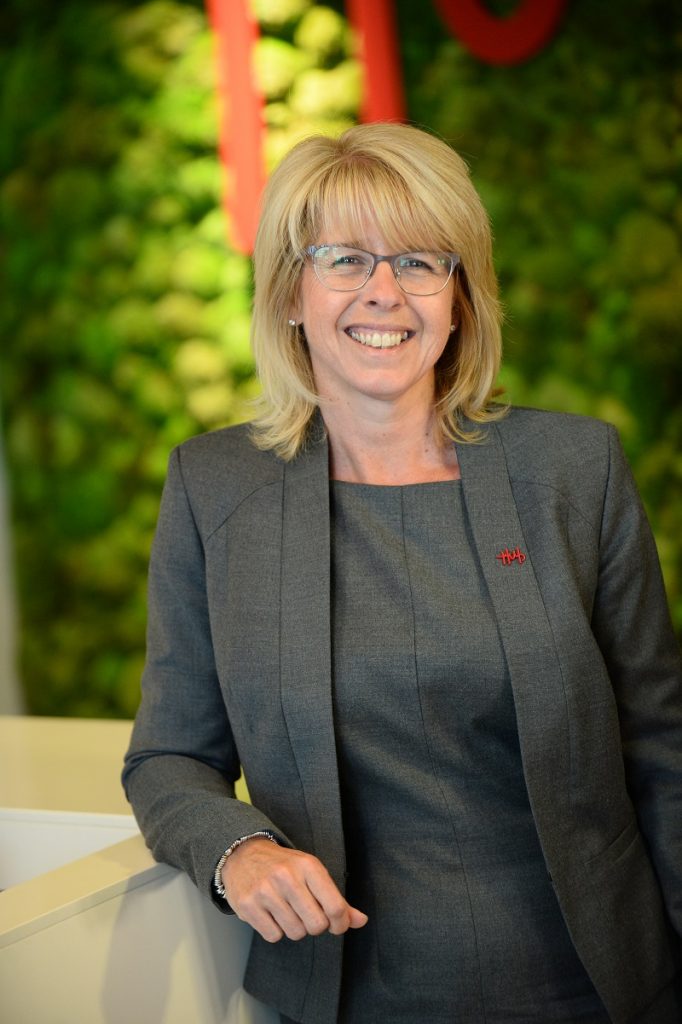 Cari-Anne Quinn Wales’ leading organisation for healthcare innovation is calling on companies and innovators from across the country to join the fight against coronavirus.
Life Sciences Hub Wales is leading industry efforts to combat COVID-19 by launching a nation-wide drive to get companies from a range of sectors working together on solutions. Having already received interest from hundreds of businesses and professionals, its mission is to accelerate the development of urgently needed products and treatments, such as ventilators, hand sanitisers and Personal Protective Equipment to ease the pressures on health care services and help protect frontline staff combatting the outbreak.
The organisation, which works to improve Wales’ health and wellbeing by facilitating collaborations and innovations between NHS Wales, industry and academia, has identified four key challenge areas that must be urgently addressed to support healthcare services during the outbreak: medical devices, infection control, digital solutions, and social isolation.
As COVID-19 cases continue to rise, and increasing numbers of patients require hospitalisation, ramping up the manufacturing and availability of medical devices such as ventilators, oxygen monitors and point of care testing equipment – both antigen and antibody testing kits– is a key priority.
Ensuring medical staff have access to hand sanitisation products as well as appropriate PPE (personal protective equipment) including face masks, eye protection, gowns, shoe covers and disposable gloves – all of which are currently experiencing shortages – is critical to minimising the spread of infection.
Rapid adoption of digital technology will also be crucial to alleviating pressures on the NHS, preventing social isolation amongst ageing communities and connecting individuals with local health and social services while they are isolating. Solutions currently being explored include virtual GP consultations, at home working solutions for healthcare professionals and artificial intelligence assisted systems to manage inbound calls to health services.
To tackle these challenges and bring products and services to the frontline at pace, Life Sciences Hub Wales is working with businesses from a range of industries, including manufacturing, food and drink, IT and healthcare. Working together, they are exploring how they can scale up production, repurpose existing products and deploy their expertise and capabilities to deal with the crisis.
That work is already seeing businesses partnering to scale up production and bring much needed products to market quickly, distilleries switching their activities to create hand sanitiser, and manufacturers committing their production lines to the assembly of urgently needed equipment.
Last week, Life Sciences Hub Wales hosted a major industry-wide virtual conference which saw over 200 participants across 150 organisations come together to discuss possible ways of working together to tackle COVID-19 in line with the four challenges.
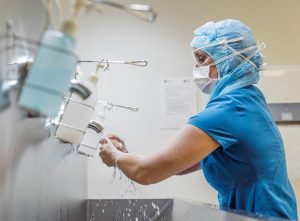 Life Sciences Hub Wales calls for industry collaboration to fight coronavirus Leading industry names from across the globe joined the call including GE Healthcare, Amazon Web Services and Siemens Healthineers. A number of key projects have been identified with more information on these set to become available in the coming days.
Minister for Economy, Transport and North Wales, Ken Skates said: “Being innovative is going to be absolutely vital in coming up with new ways of dealing with coronavirus.
“Life Sciences Hub Wales is playing a key role in this by bringing industry together with the NHS and social care to accelerate developing solutions which can save lives. I encourage all businesses and individuals who think they can make a real difference to get in touch.”
Cari-Anne Quinn, CEO at Life Sciences Hub Wales said: “We are here to help unite industry and get much needed products, services and supplies where they are needed to help protect people and safe lives.
“If you’re a business or individual and think you can help in the fight against COVID-19, we want to hear from you. Get in touch with the team at Life Sciences Hub Wales and we can help you help us all by linking you up with people and businesses who can assist you to make a real difference to lives in Wales and beyond.”
Life Sciences Hub Wales is now looking for companies and experts who could support efforts within any of the four challenge areas to get in touch via email.
Any companies interested in getting involved should email their offer of support and details of their availability and capability to: information@lshubwales.com
 Sascha Giese, Head Geek™, SolarWinds By Sascha Giese, Head Geek™, SolarWinds
Modernisation is a constant process and shouldn’t have a clear finishing point, whether it’s for the network, data centre, cloud, or IT management tools. This is necessary to ensure all systems and devices are up-to-date, functioning at the highest level and, particularly in today’s threat landscape, can protect businesses and organisations from cyberthreats. From a government organisation perspective, the government cybersecurity risk from legacy technology is perhaps greater than it is for many businesses in the private sector—the data the government stores and the functions it must be able to perform mean it’s an obvious target for cybercriminals, making modernisation a necessity and not a luxury.
Time for an Upgrade?
When the NHS needs to access patient data in an emergency, or when a court case needs to be settled, having secure networks is vital in ensuring employees can access the information and systems they need without delay. When the Ministry of Justice suffered an outage in January 2019, it caused mayhem as staff tried to complete their work without access to emails or services. It’s important to keep public sector infrastructure up and running consistently as citizens rely on it every day to keep them safe, healthy, and happy. Though many organisations are still coping with their legacy technology, the risks of having older and possibly unsafe networks are high. As systems get older, there are fewer measures in place to keep them secure, and an unsecure network is a potential loophole for cybercriminals to infiltrate and gain access to sensitive data and functionality.
One key way to ensure the networks are fully up-to-date is by standardising and consolidating government IT monitoring tools to provide a single source of truth. In doing so, IT teams can operate and troubleshoot efficiently and more easily than previously, so they can modernise as needed. Consolidated infrastructure metrics from these tools provide the data needed to help make smart, informed decisions, and ongoing performance monitoring helps ensure any negative impacts are identified and resolved quickly.
Five Steps to Modernisation
Knowing the benefits of modernisation is the easy part—organisations have to be able to complete the process to get there.
- Define the scope
What are you trying to achieve through your modernisation? What is your mission objective? These questions need to be answered at the start of the modernisation process, so IT leaders know where they’re going and the outcome they’re trying to achieve. By defining the scope of this project, everyone involved has a clear idea of the goal, and it helps to keep everyone on the same page.
- Perform an inventory
Once the team knows where it’s heading, the next step is to perform an inventory of the current IT environment and see exactly what they have available. This includes any physical devices, network servers, and other computing assets in use by the organisation. Having a centralised list of everything gives IT leaders a good foundation to establish what needs modernised and by how much. An important task in this step is to verify dependencies and check for possible compatibility issues with other elements.
- Conduct a needs analysis
The next step in the process is determining what the organisation needs and what the main priorities are, both in the short- and long-term. To do this effectively, team leaders should coordinate with IT security, operational teams, and senior leadership to decide exactly what’s needed that isn’t currently owned or updated—both hardware and software, as well as any third-party services required. The IT team can prioritise what’s required and in which order, based on what aspects of the network are at the most risk and what can continue for longer without being replaced.
- Conduct a market survey
In today’s digital society, there is a vast array of products and services on the market to fulfil any organisation’s modernising requirements. So, how can IT leaders make the most cost-effective choice? In the public sector in particular, budgets are often tight and every expense has to be justified. To truly understand what’s available and compare different offerings, IT professionals should conduct a market survey. This provides them with a good knowledge of what technology can be implemented to modernise their networks, and can help them to recognise the most valuable solution for their organisation.
- Keep moving forward
This is a phased approach to modernisation, and arguably the most important thing to remember is to keep moving and keep progressing. Modernisation is a journey without a final destination; organisations can only succeed with it if they continuously seek to upgrade and drive their technology forward year after year. Considering the rate at which both the technology and the risks threatening it are advancing, IT teams need to work to keep up with these and ensure their networks are fully secure to prevent any cybercriminals taking advantage, or even a simple system failure. To keep modernisation on track, IT professionals should measure the outcome of each step they have taken before they take the next one. If changes aren’t quantified in the right way, there’s the risk of it being unclear if it was worth it, making future technology goals harder to plan for and achieve.
In any sector—not just the public sector—networks are like a lifeline. They keep hospitals, schools, prisons, police stations, and many other public places up and running 24/7 as required, and they keep staff across multiple departments and organisations connected. Ensuring these networks are 100% up-to-date and performing at the highest possible standard is a necessity, so IT teams should follow this simple five-step plan to modernisation to help keep their systems secure and the public in safe hands.
 Emergency prepaid card Reporter: Stacy Clarke
allpay, a leading UK payment specialist, has announced a prepaid card programme has been made available to help disburse emergency funds to those affected by COVID-19. Emergency Government funds have been made available to help those in most need, and allpay’s prepaid cards can now enable those funds to be disbursed quickly and securely.
Mary Cotton, senior product manager, allpay explains: “We have worked to establish a prepaid card programme that is designed specifically around supporting councils to get funds to those experiencing hardship as a result of the Coronavirus outbreak as quickly as possible. With a set of pre-defined limits and configuration and the ability to fast-track a programme approval, we can make a new programme live and operational within two weeks of receiving instruction.
“The prepaid card programme will access a rapid application and approval process. The emergency payment card itself, is an instant issue Mastercard®. Appropriate pre-set limits can be put the on the card load value, while standard merchant category code blocks ensure spend is managed at appropriate outlets. Cards can be reloaded as required within the set limits. The solution offers a secure, accessible payment method for those in need of urgent funds for point of sale transactions, online purchases, contactless and chip and PIN payments and ATM withdrawal.”
Cards can be ordered within two weeks of confirmation of a programme set up and a streamlined implementation process will provide access to bulk orders of emergency payment cards within ten working days.
allpay currently works with around 50 councils across Britain enabling them to distribute the benefits of the prepaid cards for a variety of projects and the team is experienced in deploying such projects on both a small and large scale quickly. In the past, councils have used the cards to provide accessible funds for emergency accommodation for example, or to provide the facility to purchase specific products or provide payments for social care services.
To find out more about setting up a new Prepaid Card programme specifically for the purpose of disbursing Coronavirus emergency funds, please see: www.allpay.net
Freemasons across England and Wales are coming together to provide vital personal protective equipment (PPE) for care homes to protect the elderly, following health secretary Matt Hancock’s call for a “Herculean effort” to protect critical NHS staff.
The government is currently supplying 58,000 separate organisations including pharmacies, care homes and GP surgeries with PPE, which has led to logistical issues due to sheer demand.
While the NHS has been prioritised, care homes are struggling to source PPE equipment. The United Grand Lodge of England (UGLE), the governing body for Freemasons, has 18 care homes and 1,000 residents, through its Royal Masonic Benevolent Institution (RMBI).
 Mark Hooton and visors Dr David Staples, CEO of UGLE, said: “Freemasons have a proud history of providing care to the elderly, and as a number of our members fall into the vulnerable category, we are stepping forward to help in their time of need. No elderly person – or the staff who care for them – should believe their life is at risk due to the lack of essential equipment. And no parent or grandchild should feel their loved ones were left unprotected during this national emergency.”
He continued: “Freemasons across the country are already taking steps to safeguard our vulnerable loved ones and the millions of carers who help protect and care for them during this time.
“Not only can we help provide physical protection but we can also – through our core values of friendship, respect, integrity and charity – help provide monetary support though Age UK, the ability to provide cross-generational friendship; and highlight our respect for this generation by providing for them in their hour of need.”
In just two days, Scunthorpe Freemasons made 1,000 St Lawrence full-face visors to protect carers working for the RMBI. The work was done at the premises of Cymarc Engineering, which normally makes components for the rail sector and the motorbike industry.
Company owner Mark Hooton said: “From nothing to 1,000 St Lawrence visors were manufactured, assembled and packed in just two days. I’ve been overwhelmed by the help of volunteers who’ve stepped up to help make this possible. Without them this would not have happened.”
Freemasons across England and Wales are joining forces to provide essential PPE equipment to care homes to protect the vulnerable and the staff who care for them.
Nearly 5,000 visors have already been produced with help from the Freemasons, who have adapted their businesses production lines to meet demand.
A dedicated Covid-19 group will now spearhead a national campaign to ramp up production in order to supply care homes and others who need help.
Mr Hooton switched his highly specialised industrial laser-cutting equipment to producing aluminium frames for his own design of visor in a move prompted by a cry for help from the RMBI, which was looking for visors for staff in its care homes. Within 24 hours, he had created a prototype, and was then supported by other members of his lodge and his staff in gearing up to produce hundreds every day, including sourcing raw materials, establishing logistics channels, setting a production line and defining the product in a document.
Mr Hooton is now supplying 600 visors for the Carers Trust, which had been unable to secure a single visor for its staff due to the national shortage.
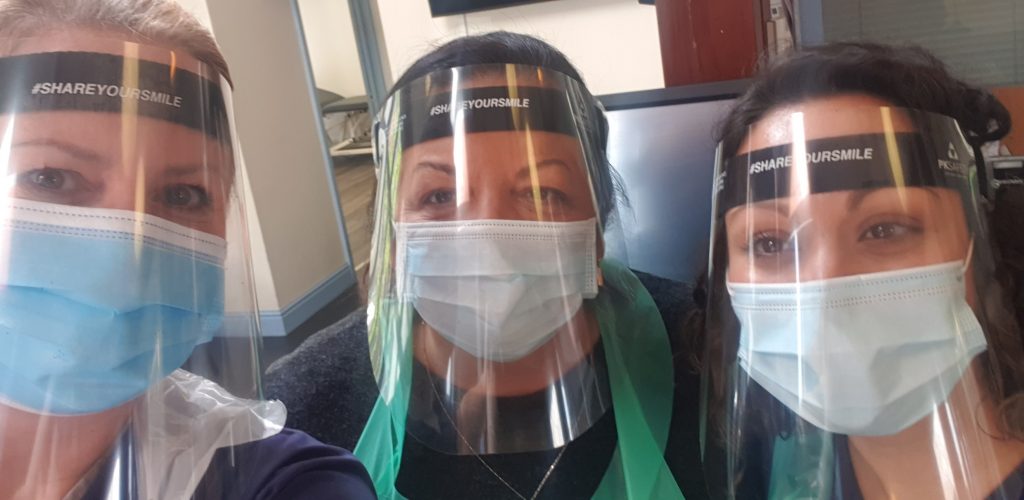 Abadare Homes Freemason Sean Fitzgerald from Valence 5388 Lodge, which meets in Upminster, also donated 500 packs of antiseptic wipes to the Carers Trust and 500 visors to NHS Moorfields Eye Hospital.
Face shields to protect frontline and key workers are also being made by Colin Breckons from Norwich. He is making the face shields using his 3D printers and giving them away free to the NHS and other key workers. A monetary donation came from Freemasons to help produce the visors. He has been inundated with requests and says there is a struggle to find the plastic needed for the visors, of which he aims to make at least 2,000.
In Wales, Freemasons from the Aberpennar Masonic Lodge, Aberdare donated 100 safety visors to surgeries in the North Cynon Valley.
Beverley Evans, advanced nurse practitioner, said: “I would like to thank Aberpennar Lodge, on behalf of the surgeries in North Cynon Valley, for the 100 visors they’ve donated. We are so grateful for this much-needed equipment that was organised by Mark Griffiths and his wife Joanne. I also want to say this has really highlighted the good work Freemasons do, as people are very unaware of the charitable work done by the Freemasons.”
North Wales Freemasons donated £2,250 to help produce PPE face visors, after Joseph Mearman – from
St David’s Lodge – set up a 3D printer system to make visors for local hospitals.
UGLE’s Dr Staples added: “I am extremely proud of how our members have helped to step into the breach during this national crisis. This is just the tip of the iceberg in terms of the support we will be providing. We are now galvanizing the membership on a national level to help ramp up demand, and we aim to be supplying thousands of new items of PPE in the next few weeks.”
Freemasonry is one of the largest charitable givers in the country, contributing more than £48m to deserving causes in 2018 alone. And Freemasons do not only donate money – more than 18.5 million hours of volunteer work was undertaken by Freemasons in 2018.
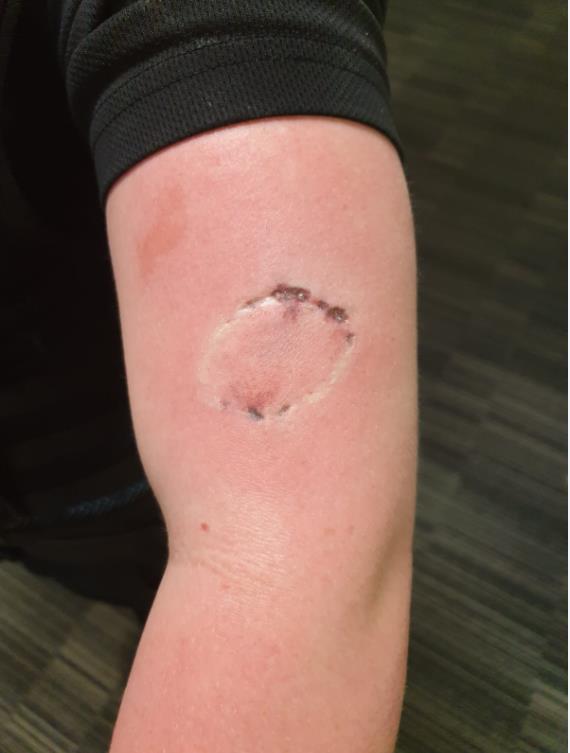 The officers arm bitten by the man Reporter: Stuart Littleford
A man is in custody after an officer was badly bitten in Rochdale, Greater Manchester.
Yesterday evening at around 6.40pm, a police constable was responding to reports of a man causing a disturbance on Drake Street in Rochdale, when she was bitten.
Attending officers had attempted to explain to the man that in line with government guidelines around Covid-19, people shouldn’t be going around to other people’s homes. Whilst trying to engage with the man, two officers were both punched. One of those officers – a 21-year-old police constable – was then seriously bitten and had to attend hospital, before being discharged to recover at home.
A 29-year-old man was arrested on suspicion of criminal damage, domestic violence assault, section 18 assault with intent to resist arrest and regulation 8 of the Health Protection Regulation 2020 (Corona Virus). He remains in police custody for questioning by officers.
Superintendent Richard Hunt, of GMP’s Rochdale district, told GPSJ: “No police officer should have to come to work – doing a job to serve and protect our communities – and be assaulted. It is absolutely disgusting that my officer was faced with this last night and all of our thoughts are with her as she rests at home.
“I recognise that the pictures we are releasing today are quite graphic but I hope they help people to understand the vicious nature of this attack and I know that the people of Greater Manchester will join me in wishing our officer a fast and peaceful recovery.
“This is a particularly challenging time for everybody at the moment, made worse by something so mindless like this. Having spoken to the officer earlier this morning, she said that last night’s incident was a stark contrast to the support she has felt over the past few days, whilst she has been delivering Easter eggs to local children whilst out on patrol. This just goes to show that thankfully, incidents like this are not a reflection of the vast majority of the public, who are showing great support to us.”

Jim Roberts, Director at Fourth Street, reacts to the recent controversy over the use of public parks during the Covid-19 crisis
Our public parks were both a blessing and a battleground on the first sunny weekend of spring this year.
People flocked to their nearest park for some much-needed respite from weeks of tough, but necessary isolation. The need for a walk in the park was especially acute in major cities where so many residents live in shoebox flats with no gardens or balconies of their own.
Current government guidelines say you can leave your home for ‘one form of exercise a day, for example a run, walk, or cycle’. Many people thus welcomed the weekend’s warm weather by ‘exercising’ in public parks.
This caused a commotion in the news and on social media, where every image of a picnic or an impromptu game of football sparked a feverish debate. Are we carelessly flouting the social distancing norms that are meant to save lives and ease the pressure on the NHS? Or, how can elitist politicians with sumptuous back gardens lecture the flat-dwelling masses for taking a walk in the park after weeks of incarceration?
Matters were made worse by a steady stream of anecdote and indignation on social media. Depending on who you read and when, our parks were either over-run by selfish sunbathers or they were an indispensable resource for people who generally kept their social distance and played by all the rules.
Lambeth Council has since made headlines by closing Brockwell Park.
I’m lucky. I have a small garden. I can stroll outside as often as I like. My kids can jump on their trampoline. But many don’t have that luxury. A local park is their garden and a playground for their children. It is their breath of fresh air. For access to be restricted to ‘one form of exercise per day’ is a difficult pill to swallow.
The whole episode has prompted a few reflections about public parks in the near and the long term.
To keep our beloved parks open through the lockdown, we need to change the way they are marshalled and managed. If parks were previously just amenities for residents, they have become – in today’s peculiar circumstances – destinations for a much larger market. Councils are thus learning a hard lesson in destination management: congestion is as much a factor of dwell time as it is a function of visits. Last weekend’s issue was not the fact that so many people visited their nearest park – it’s the fact that too many of them stayed to relax, have a picnic, and catch some rays.
(And, no, it doesn’t matter that most of those people were spread out and social distancing anyway. Once you adopt a permissive attitude to extended dwell time in parks, it won’t take long for the market to start rationing access by its own means, similar to the way the market – left to its own devices – determined who got all the toilet roll and pasta before supermarkets put rules in place.)
People should be allowed – even encouraged – to use their local park through this crisis. But they mustn’t bunch or loiter unnecessarily. Cycle, jog, walk, stroll, amble even – but keep it moving if you can.
It would also help for UK cities to adopt measures seen elsewhere (e.g. New York, Denver) by closing some roads to traffic. This would provide extra public space for people to get their daily exercise. It would provide more space to walk, jog and cycle without over-crowding sidewalks or the narrows paths through parkland.
More important is the lesson we take from this for the longer term. Fourth Street regularly advises local authorities on how to manage their parks with increasingly limited resources. It is dispiriting work. With no statutory protection, public parks have generally been fighting a losing battle to cost-cutting measures. Some local authorities have been forced to sell off their parks, while others have been forced to close. Almost all are at risk of creeping privatisation.
 While it is commendable for the National Trust and the National Lottery Heritage Fund to pursue new models for the management and operation of public parks, it is unfortunate that the they have been forced into this position by the systemic, top-down disregard for the importance of parks as a determinant of public health. While it is commendable for the National Trust and the National Lottery Heritage Fund to pursue new models for the management and operation of public parks, it is unfortunate that the they have been forced into this position by the systemic, top-down disregard for the importance of parks as a determinant of public health.
Last weekend’s controversy is a timely reminder that parks are the quintessential ‘public good’, in the strictest economic definition of the term. Most urban parks were either gifted or developed for exactly the purpose they are now being used – as breathing space for people who do not enjoy the privilege of their own private garden. Before this crisis too many councils were busily virtue-signalling their commitment to our ‘health and well-being’ while simultaneously gutting their park budgets and turning them into concert venues, fun fairs, and sports grounds.
Today’s crisis shows how parks – and swimming pools, for that matter, but I’ve written about that before – are meant to serve, first and foremost, a public health function. If Government is serious about prioritising our mental and physical well-being, then it should properly fund its parks – for the public good; as a public good.
The maths of managing parks on a shoestring just don’t add up. You can’t run parks for a profit. They must be protected by statute. They are part and parcel of our history and heritage and a vital means of maintaining the public health – especially, but not exclusively in cities.
I don’t blame the public for descending on parks this weekend, although I would urge the picnickers and sunbathers to grin-and-bear these unfortunate short-term restrictions. There are people who genuinely do need to sit for a spell on a park bench or to feel the grass beneath their feet – they shouldn’t have their access denied by my desire to throw a frisbee.
I do, on the other hand, blame successive governments for failing to enact any meaningful protection for our public parks and open spaces. Out of the Covid-19 catastrophe should come explicit recognition for the importance of public parks, with the the statutory protection and investment they deserve.
 Teesside University A practical support package to help businesses through the coronavirus emergency has been put together by Teesside University.
Along with other agencies, the University is working with the Tees Valley Mayor and Combined Authority to ensure a coordinated approach, helping the region’s businesses to stay resilient and to be ready to grow when the crisis is over. The University’s business support offer has won national awards for its contribution to the region’s economy, and staff are now ready to make good use of expertise and resources in helping companies cope with the impact of Covid-19. Services range from helping businesses transition to an online offering, to working with them to access Government advice and financial support. In addition, Teesside Launchpad, the University’s graduate enterprise hub, will be rolling out its Microbiz Academy across the region, providing invaluable online support and advice to anyone wanting to set up an internet-based small business.
Laura Woods, Director of Academic Enterprise at Teesside University, said: “We’re all acutely aware of the massive challenges this crisis has created for businesses, both large and small. It’s vital that we work together as a region to help our businesses withstand the economic impact of Covid-19 and to be ready for strong recovery. We want to play our part in helping companies in the Tees Valley and further afield get through this crisis and emerge as strong as possible, positioned for competitive performance. We’ve developed this package of support from our existing business programmes and expertise, adapted to address what businesses will need in the current economic climate. We’re making our support flexible and bespoke so that it can meet individual needs, so we would urge any business to get in touch.”
Support offered by the University to businesses includes:
- Supporting companies transferring from physical services to online delivery
 Laura Woods
- Raising awareness and helping business access Government support
- One-to-one support for founders and business owners
- Writing bids for grants
- Business diagnostics and reviews of processes and needs
- Mentoring
- Webinars
- Brokerage and networks – connecting businesses with each other and with others who could help
- Ongoing help with graduate resource and recruitment
- Continued leadership and management support
Tees Valley Mayor Ben Houchen said: “The coronavirus pandemic is presenting an extraordinary and unprecedented challenge to every aspect of our lives, and companies of all sizes are feeling the impact. But this situation has seen us all pull together to help keep them afloat. I’m delighted that Teesside University has joined the growing ranks of organisations across Teesside, Darlington and Hartlepool that are offering their expertise to those who need it most, helping to protect and guide our brilliant businesses at this difficult time. Business owners and the self-employed shouldn’t forget they can get also information and advice on Government support by calling the Tees Valley Business Support Line on 01642 662 777 or emailing support@teesvalley-ca.gov.uk.”
For more information about Teesside University’s coronavirus support services to business email business@tees.ac.uk or telephone 01642 384068.
 Anne Godfrey Reporter: Stacy Clarke
The Chartered Institute of Environmental Health (CIEH) has today announced that Anne Godfrey is to leave the membership body following four successful years as Chief Executive.
Having joined CIEH in 2016, Anne delivered a significant change programme to restore financial stability, refocus on membership and the profession and ensure a sustainable future.
The last four years has seen the organisation develop into an agile and dynamic professional body with a growing membership of practitioners from the public, private and third sectors.
Anne is leaving CIEH to join GS1 UK as their new Chief Executive and will take up her post in August.
Siraj Choudhury, Chair of the CIEH Board of Trustees, told GPSJ:
“The comprehensive transformation of CIEH under Anne’s leadership has been remarkable. The organisation was in a financially precarious position when Anne joined us. As a result of her inspirational leadership, we have been able to take staff and members with us through our evolution. Anne leaves CIEH in a far stronger position.
CIEH is now a forward-facing organisation that promotes the environmental health profession and puts members at the heart of everything we do. Anne has worked fantastically well with the Board of Trustees and has motivated the staff with her drive and enthusiasm. As a result, we now have a sustainable and influential organisation.
We thank Anne for her immense contribution and we wish her well in her new role and for the future.”
Anne Godfrey, Chief Executive of CIEH, told GPSJ:
“The last four years have been both challenging and rewarding and I am sad to be leaving such an amazing organisation, with dedicated staff, trustees, volunteers and members.
The business turnaround we embarked upon in 2016 was not always easy. But I am proud of how far we have come and trust that the cultural and financial transformation that has taken place will ensure that CIEH continues to be the voice of our members and the profession.
Environmental health is of vital importance to our country and our world, and I am honoured to have worked with so many people who make such a positive contribution to our society.
I would like to thank staff, colleagues and members who helped deliver our transformation. It would not have happened without their commitment, passion and support.”
 Landmarc MD Mark Neill Reporter: Stuart Littleford
Mark Neill, the Managing Director of Landmarc Support Services (Landmarc) has announced that military veterans will be guaranteed interviews for jobs at Landmarc.
Mark is himself a military veteran and feels passionately that Landmarc should match the recent commitment the Government has made to veterans in guaranteeing them interviews for civil service jobs[1].
Guaranteed interviews for military veterans at Landmarc will start with immediate effect. As a longstanding employer of ex-service personnel, Landmarc believes that this important commitment will help the company secure the skills and experience the business needs today and in the future.
A significant number of veterans already work for Landmarc at every level of the business, bringing invaluable knowledge learnt from the Armed Forces to the company’s national workforce.
Mark commented: “Service personnel often have the attributes we are looking for at Landmarc; agile, dedicated, strategic and excellent team players; a guaranteed interview will ensure we attract this talent and be a better business for it.
“I also recognise the unique opportunity Landmarc offers those leaving the Armed Forces. Our business provides support services across the UK Defence Training Estate, a familiar environment for anyone that has served and therefore a positive environment for the transition to civilian jobs – a journey that can be a challenge for some. Working at Landmarc keeps veterans close to the military and they become part of our mission to provide the best possible training experience for our Armed Forces.
“There will be no time limit between leaving military service and when an individual can take up the guaranteed interview offer, applicants will simply need to meet the basic minimum criteria for the job during the selection stage.
“Landmarc is proud to be pro-active in boosting the employment prospects of those who have served in the British Armed Forces and this new initiative will help us deliver our wholehearted commitment to the Armed Forces Covenant.”
For more information, please visit www.landmarcsolutions.com.
[1] www.gov.uk/government/news/government-delivers-on-promise-to-veterans-announcing-guaranteed-interviews-for-government-jobs
Reporter: Stuart Littleford
BASW Chair and CEO issue letter to Prime Minister to support social workers
Social workers are on the front line of efforts to minimise the impact of Covid-19 across the four countries of the UK and undertake a range of statutory duties, including protecting vulnerable children and adults, supporting disabled adults and frail older people and working with individuals who face severe mental health challenges as well as other important work.
For social workers to do their work efficiently and compassionately they must be safe, have guidance and be supported.
Read the letter to the PM here.
BASW has told GPSJ their key asks are: –
1. Personal Protective Equipment
Social workers, alongside colleagues in health and residential care, need government guidance on personal protective equipment (PPE) urgently. While some social work can be done via phone and teleconferencing, seeing in people in their homes is central to the social work task.
Social workers can see up to a dozen or more service users a day and, at the moment, there is a lack of even basic hand sanitiser, leaving social workers concerned for service user’s safety and their own safety. Measures are being applied unevenly across different local authorities and workplaces and there is a need for clearer guidance that can be applied uniformly. There is also an urgent need for essential guidance on safety for home visits during the pandemic.
2. Priority Groups for Testing
Social workers should be included in the list of priority groups for coronavirus testing. Many teams are depleted because colleagues need to self-isolate. Vulnerable service users also need assurance that their social workers can visit them in their home without the risk of infection. Including social workers in the list for priority testing is thus essential for the provision of on-going services.
3. Supporting social workers back into the workforce
Alongside colleagues in health, the police and colleagues in other essential services we welcome the opportunity for social workers to re-enter the workforce. Many social workers who are currently out of the workforce are coming forward to help at this time of crisis. We will work closely with the regulators to support individuals re-entering the workforce.
4. Support to vulnerable groups
We recognise the need that many public health messages need to be aimed at the majority. But our concern as social workers is also with the minorities. For example, victims of domestic abuse who may be trapped with their abuser, undocumented migrants, asylum seekers and refugees whose first language is not English and may therefore miss crucial health guidance, the street homeless who may be unable to self- isolate. We know that a number of initiatives are already underway (e.g. the instruction to local authorities to house all street homeless by last weekend) and we welcome these. However, we need the government to redouble efforts with reaching out to these groups.
5. Communication
Across the country people are pulling together and making sacrifices to help save lives, none more so than health, social care and other professionals. Social workers are among those essential professionals. We were pleased to hear your Secretary of State for Health, Matt Hancock, pay tribute to social workers as he introduced the Coronavirus Bill in the House last week and we ask that Ministers where possible make direct reference to social work and social workers in their public addresses.
 Unremitting financial pressures, ongoing staff reductions and the unforgiving need to deliver new political initiatives against tight budgets are leading local, regional and national government managers across the UK to turn to outsourced private sector business transformation experts for the delivery of organisational change and new services. Unremitting financial pressures, ongoing staff reductions and the unforgiving need to deliver new political initiatives against tight budgets are leading local, regional and national government managers across the UK to turn to outsourced private sector business transformation experts for the delivery of organisational change and new services.
A leading supplier of this kind of high-level support is the Bristol-based consultancy, Transformation-Leaders.com, whose Managing Director, David Pinchard, says: “We fully understand the financial and manpower restraints facing the UK’s public sector and have responded with a unique and cost-effective business model that can help these under-pressure managers deliver new services and political initiatives whilst complying with all necessary financial standing orders, HR regulations and ‘best value’ criteria.
“Starting with a well-constructed project specification is the key to success,” says David. “The tighter the tender, the greater the return on investment and the more successful the outcome”.
“This is why we like to be in at the start of a project and work alongside clients to develop a well-thought out specification, clear objectives and a realistic timetable for the successful delivery of the project, especially those that are valued under the EU’s ‘small lots’ threshold @ c. £65,630 or c.£118,130 for central government contracts.
 David Pinchard “Once the specification is in place, our clients then have the option of going out to tender – which can often be a lengthy and unpredictable process – or they can contract one of our pre-qualified business transformation experts to deliver the project, starting work within a few days and with strict cost-controls in place.
“Government agencies which we have helped in this way include the General Social Care Council, the Legal Services Board, the Farming and Wildlife Advisory Group, the Law Society and the Stationery Office and Ordnance Survey, along with local authority and regional government agencies across many sectors.
“Our clients are always surprised to learn that this kind of highly-qualified managerial support can be acquired within such a short turnaround period and that transformation-leaders.com will continue to provide 24/7 back-up support should unforeseen circumstances or problems arise.
“Full details of how we work can be found on our website – www.transformation-leaders.com which demonstrates our ability to deliver complex public and private sector projects on time, on budget and to specification, no matter what it takes, and with offices in London, Bristol and Halifax, help and advice is never far away”.
Contact David Pinchard:
T: 020 7830 9663
E: david.pinchard@transformation-leaders.com
W: www.transformation-leaders.com
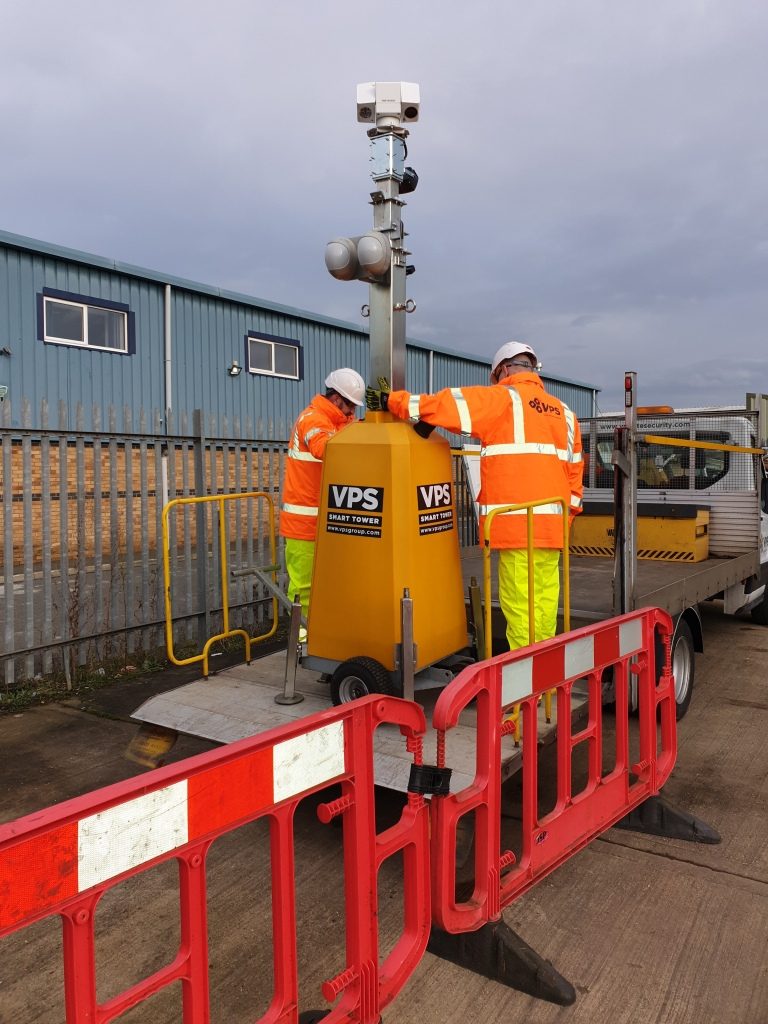 VPS Smart Tower being off loaded from truck Reporter: Stuart Littleford
Police forces across the UK are having to carry out extra night patrols in empty city and town centres, as burglars target shops, pubs and other commercial premises during the coronavirus lockdown.
Collating intelligence data from police reports, news items, and their own customer feedback, the property security specialists, VPS UK, has seen a sudden rise last week in burglaries and attempted thefts in Manchester, Merseyside, Gwent and Cleveland.
“It’s no surprise that when whole city centres are deserted, that opportunistic thieves will take their chances, especially with an already stretched police service.” Says David Wormald, Key Account Director for Hospitality & Retail at VPS. “And because so many people are staying at home now, there’s even fewer chances that an attempted burglary on a commercial site will be spotted and reported.”
Last week the British Security Industry Association confirmed that the current definition of key critical workers includes regulated security professionals. Roles essential to supporting law and order, with the potential to reduce demand on policing, also meet the critical worker definition. This includes the guarding and CCTV monitoring of empty or closed commercial, retail or office premises, and the provision of alarm response centres including mobile units.
“Even though it is a designated key worker sector, the security industry also has to place a priority of care for its workers during the virus crisis. Inevitably we will have some operational strains if more staff are required to self-isolate.” Says Mr Wormald. “But we are more fortunate than others in being able to deploy both guards and/or CCTV security systems, because the latter is a safe, socially distant means to monitor premises via a remote video monitoring centre. Vulnerable premises like construction sites, which contain valuable plant and equipment, are now standing empty for a few weeks, so they need to kept secure.”
“No two sites are ever the same, and when the March UK crime statistics are published soon, it would be worth checking to see if one area has witnessed a greater rise in criminal activity on commercial premises than another. That would be one indication of greater vulnerability for shops and pubs, for example, and may highlight where additional security measures might be needed.” He concludes.
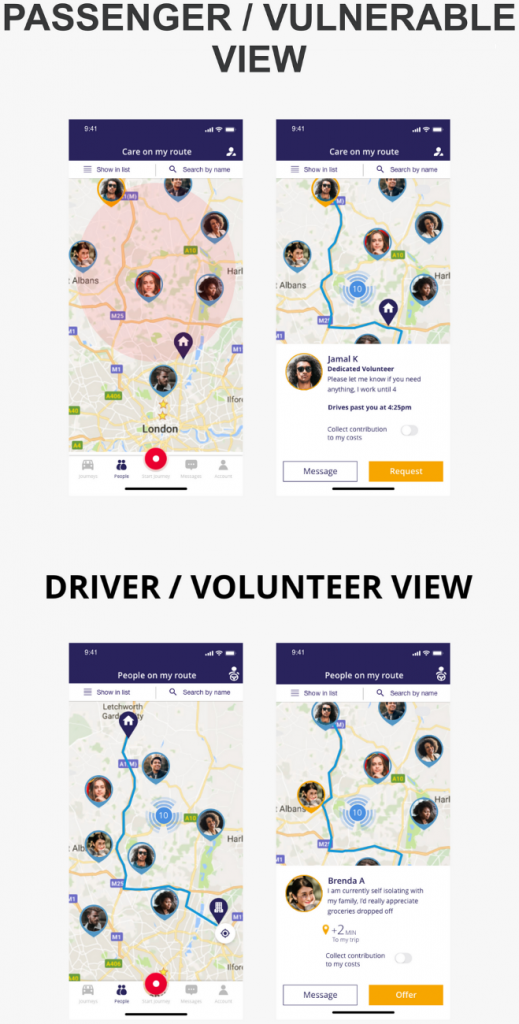 Journey sharing app provides easy way for those in need to see the people around them who can help Journey sharing app provides easy way for those in need to see the people around them who can help
Reporter: Stuart Littleford
As the government writes to 1.5 million vulnerable people to urge them to stay at home for 12 weeks, the community ethos of the Faxi car pooling app is coming to the fore.
Faxi is a commuter journey sharing app used by many hospitals, local authorities and some of the largest employers in the UK. It is now actively working with its clients to help them use the platform to identify trusted volunteers who want to support their co-workers and make them visible in a map-based social network so that support can be provided for those in need.
Any organisation that is already using Faxi can nominate trusted individuals as ‘dedicated drivers’. These individuals – including their location – will then be easily identifiable for those who need support (see illustration left).
Other organisations can also set up a Faxi community for free (for up to 20 users) directly from the Internet and start creating communities where volunteers can plan support for those in need.
“This is a case of technology for good”, explained Tony Lynch, co-founder and CEO of Faxi, whose majority shareholder is Toyota Financial Services. “Faxi can be used by private communities of workers, who might previously have been using the app for journey sharing, to identify those who are available to help others – and those who need help.
“We will be working with our clients throughout the emergency period as we are conscious that many local authorities face a monumental task to provide support to the 1.5m vulnerable and we hope to be in a positon to support this effort. The whole of Faxi is committed to help in this effort if needed.”
Established in 2013, Faxi has revolutionised the concept of carpooling for commuters with its unique smartphone app. The Faxi Software as a Service (SaaS) enables organisations to set up closed, private groups only available to employees, with a route-matching algorithm which suggests potential carpooling partners based on similar routes to work.
Carpooling app helps communities support each other
The mapping technology of carpooling app, Faxi can be used to help the 1.5 million vulnerable people staying at home for 12 weeks.
Click here to find out more.
|
NEED AN UP TO DATE DATABASE? 
|




 Real-Time Payment Notifications provide real-time updates on card acceptance transactions
Real-Time Payment Notifications provide real-time updates on card acceptance transactions

 The race is on to find a vaccine to COVID-19 and big data analysis is at the forefront of data modelling trends of the pandemic.
The race is on to find a vaccine to COVID-19 and big data analysis is at the forefront of data modelling trends of the pandemic. By Graham Jarvis, Freelance Business and Technology Journalist for GPSJ
By Graham Jarvis, Freelance Business and Technology Journalist for GPSJ












 While it is commendable for the National Trust and the National Lottery Heritage Fund to pursue
While it is commendable for the National Trust and the National Lottery Heritage Fund to pursue 





 Unremitting financial pressures, ongoing staff reductions and the unforgiving need to deliver new political initiatives against tight budgets are leading local, regional and national government managers across the UK to turn to outsourced private sector business transformation experts for the delivery of organisational change and new services.
Unremitting financial pressures, ongoing staff reductions and the unforgiving need to deliver new political initiatives against tight budgets are leading local, regional and national government managers across the UK to turn to outsourced private sector business transformation experts for the delivery of organisational change and new services.






Recent Comments